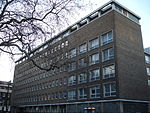University College London, which operates as UCL, is a public research university in London, United Kingdom. It is a member institution of the federal University of London, and is the second-largest university in the United Kingdom by total enrolment and the largest by postgraduate enrolment.
Established in 1826, as London University (though without university degree-awarding powers), by founders inspired by the radical ideas of Jeremy Bentham, UCL was the first university institution to be established in London, and the first in England to be entirely secular and to admit students regardless of their religion. It was also among the first university colleges to admit women alongside men in 1878, two years after University College, Bristol. Intended by its founders to be England's third university, politics forced it to accept the status of a college in 1836, when it received a royal charter and became one of the two founding colleges of the University of London, although it achieved de facto recognition as a university in the 1990s. It has grown through mergers, including with the Institute of Ophthalmology (in 1995), the Institute of Neurology (in 1997), the Royal Free Hospital Medical School (in 1998), the Eastman Dental Institute (in 1999), the School of Slavonic and East European Studies (in 1999), the School of Pharmacy (in 2012) and the Institute of Education (in 2014).
UCL has its main campus in the Bloomsbury area of central London, with a number of institutes and teaching hospitals elsewhere in central London and has a second campus, UCL East, at Queen Elizabeth Olympic Park in Stratford, East London. UCL is organised into 11 constituent faculties, within which there are over 100 departments, institutes and research centres. UCL operates several museums and collections in a wide range of fields, including the Petrie Museum of Egyptian Archaeology and the Grant Museum of Zoology and Comparative Anatomy, and administers the annual Orwell Prize in political writing. In 2021/22, UCL had a total income of £1.75 billion, of which £525 million was from research grants and contracts. The university generates around £10 billion annually for the UK economy, primarily through the spread of its research and knowledge (£4 billion) and the impact of its own spending (£3 billion).UCL is a member of numerous academic organisations, including the Russell Group and the League of European Research Universities, and is part of UCL Partners, the world's largest academic health science centre. It is considered part of the "golden triangle" of research-intensive universities in southeast England. UCL has publishing and commercial activities including UCL Press, UCL Business and UCL Consultants.
UCL has many notable alumni, including the founder of Mauritius, the first Prime Minister of Japan, and one of the co-discoverers of the structure of DNA. UCL academics discovered five of the naturally occurring noble gases, discovered hormones, invented the vacuum tube, and made several foundational advances in modern statistics. As of 2022, 30 Nobel Prize winners and three Fields medallists have been affiliated with UCL as alumni or academic staff.








